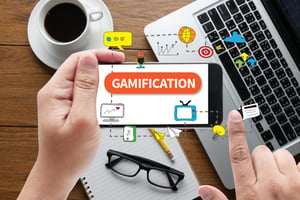Share this
Will Video Games Influence Your Next Hiring Decision?
by Robert McNicholas on June 30, 2014
For Gen Xers, the idea of getting paid to play video games seemed like a dream; for Millennials, a career in game development or design is a very real possibility. But games as part of the workplace? Not so much, right?
Not long ago, a friend of mine confided that she felt distinctly uncomfortable when her boss advised her to play Candy Crush during a lull in work. It wasn’t that long ago that you clicked down solitaire when your boss came into the room, so how is it that video games are poised to change the way we work?
The answer is called gamification.
What Is Gamification, and Why Should I Care?
 Simply put, gamification is the technique of using the concepts of video game play in real life. It’s a sort of digital carrot. Players indulging in a round or two of their favorite game are spurred on to complete levels, unlock new games, win special power-ups, and generally get their name in fake glowing lights on the leaderboard.
Simply put, gamification is the technique of using the concepts of video game play in real life. It’s a sort of digital carrot. Players indulging in a round or two of their favorite game are spurred on to complete levels, unlock new games, win special power-ups, and generally get their name in fake glowing lights on the leaderboard.
How does this apply to businesses? All of these reward-seeking behaviors can be used to drive performance in the real world. Some companies are already using game-style points systems and peer-awarded merit badges to motivate workers; others are using them to attract and keep customers. Think of the levels that top commenters gain on forums or the reward points you get from brand loyalty cards.
Given that this technique involves tracking people’s contributions and potentially modifying their behavior, gamification does have its detractors. Concerns about how much of users’ information is being tracked and stored, as well as how much security people are giving up, are already being raised.
Cool (Weird?) Ways Gamification Can Be Used In Hiring and Training
Whether gamification is cool or weird depends on your outlook. It is already being promoted for use as a way of weeding out job applicants based not on their resumes, their intrapersonal skills, or their appearances—but on how they handle playing a game. And this is just one way gamification has started to change the hiring process.
Currently, Marriott uses a Facebook game to simulate managing a busy hotel kitchen. Not only does this game get their brand name noticed, it also could be used to develop interest in a career as a hotel manager. Games like Diner Dash and Build-a-Lot specifically tap into time management and prioritization skills. Employers could use a similar, albeit customized, version of these games to measure aptitude for jobs that require dealing with a time crunch. By tracking an applicant’s or an employee’s methods of playing the game, including how long he or she takes to make a decision and how particular tasks are completed, the idea is that HR people could gain insight into a person’s behavior and personality that would have a direct bearing on job performance.
For most businesses—large and small—gamification in hiring can be filed away in the “Future Events” folder. Hiring can be a complex process, and there’s no sure-fire shortcut to determining job performance. Would you use games to help weed out qualified applicants from the unqualified? Could you see yourself using levels, merit badges, and reward points to motivate employees?
In the meantime, read up on the subject. Start with this intriguing post by Jacob Morgan, then move on to Jeanne Meister’s analysis, and finally, look at this article from Fox Business.
Share this
- Featured (119)
- Best Practices (75)
- Business (72)
- Small Business (72)
- Security (43)
- Managed Services (34)
- Business Growth (32)
- Technology News (26)
- Google For Work (22)
- it support (15)
- Social Media (13)
- Technology (11)
- Malware (10)
- Google (9)
- News (9)
- Productivity (9)
- Technology Support (8)
- Cloud (6)
- seo (6)
- Backup Storage (5)
- Website (5)
- Communication (4)
- Ransomware (4)
- Research (4)
- Analytics (3)
- Windows (2)
- anti malware (2)
- email (2)
- how to (2)
- laptops (2)
- mobile (2)
- Hubspot (1)
- data recovery (1)
- twitter (1)
- July 2024 (1)
- June 2024 (2)
- May 2024 (2)
- April 2024 (2)
- March 2024 (2)
- November 2022 (3)
- October 2022 (1)
- September 2022 (3)
- August 2022 (3)
- December 2021 (3)
- November 2021 (3)
- October 2021 (1)
- September 2021 (3)
- August 2021 (3)
- July 2021 (1)
- March 2021 (1)
- February 2021 (7)
- January 2021 (1)
- March 2020 (1)
- August 2019 (1)
- April 2019 (4)
- March 2019 (6)
- December 2018 (10)
- November 2018 (10)
- August 2018 (1)
- July 2018 (9)
- June 2018 (4)
- May 2018 (4)
- October 2017 (3)
- September 2017 (6)
- August 2017 (6)
- July 2017 (12)
- June 2017 (12)
- May 2017 (3)
- March 2017 (5)
- February 2017 (2)
- August 2016 (2)
- June 2016 (4)
- January 2016 (1)
- December 2015 (3)
- November 2015 (3)
- October 2015 (3)
- September 2015 (3)
- August 2015 (2)
- July 2015 (4)
- June 2015 (3)
- May 2015 (2)
- April 2015 (1)
- March 2015 (1)
- February 2015 (1)
- January 2015 (2)
- November 2014 (4)
- October 2014 (11)
- September 2014 (5)
- August 2014 (6)
- July 2014 (6)
- June 2014 (8)
- May 2014 (3)
- April 2014 (3)
- March 2014 (2)

